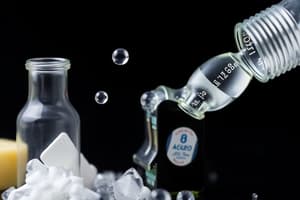Podcast
Questions and Answers
Which food additive is known to cause changes in the DNA of cells?
Which food additive is known to cause changes in the DNA of cells?
- Potassium nitrate
- Butylated Hydroxy-Anisole (BHA) (correct)
- Monosodium glutamate (MSG)
- E151 Brilliant Black BN
In which category of foods is E151 Brilliant Black BN commonly found?
In which category of foods is E151 Brilliant Black BN commonly found?
- Drinks (correct)
- Fruits
- Meats
- Baked goods
What is the function of E621 Monosodium glutamate (MSG)?
What is the function of E621 Monosodium glutamate (MSG)?
- Preservative
- Thickening agent
- Coloring agent
- Flavor enhancer (correct)
Which food additive can lower the oxygen-carrying capacity of the blood?
Which food additive can lower the oxygen-carrying capacity of the blood?
Why have many baby food producers stopped adding MSG to their products?
Why have many baby food producers stopped adding MSG to their products?
Which food additive is classified as possibly carcinogenic to humans by The International Agency for Research on Cancer?
Which food additive is classified as possibly carcinogenic to humans by The International Agency for Research on Cancer?
What is the function of antioxidants in food products?
What is the function of antioxidants in food products?
Which food additive category includes sodium alginate as an example?
Which food additive category includes sodium alginate as an example?
Which natural ingredient from the vitamin E family acts as a natural antioxidant?
Which natural ingredient from the vitamin E family acts as a natural antioxidant?
What is the main function of stabilisers in food products?
What is the main function of stabilisers in food products?
Which category of food additives does the substance E120 belong to?
Which category of food additives does the substance E120 belong to?
Which food additive is used specifically to inhibit the browning of cut fruits?
Which food additive is used specifically to inhibit the browning of cut fruits?
What is the function of a preservative in food products?
What is the function of a preservative in food products?
In the context of food additives, which category includes acetyl gallate derivatives?
In the context of food additives, which category includes acetyl gallate derivatives?
Which food color is derived from pregnant scale insects?
Which food color is derived from pregnant scale insects?
What is the main purpose of using food additives in food processing?
What is the main purpose of using food additives in food processing?
Which category of food additives includes thickeners, stabilisers, and emulsifiers?
Which category of food additives includes thickeners, stabilisers, and emulsifiers?
What is the main purpose of adding curcumin (E100) to food products?
What is the main purpose of adding curcumin (E100) to food products?
Flashcards are hidden until you start studying
Study Notes
Food Additives
- Food additives improve palatability, appearance, keeping quality, storage life, and safety, while minimizing food wastage.
- Additives are categorized into several groups, including colours, preservatives, antioxidants, thickeners, stabilizers, and more.
Colours (E100-199)
- Colours are substances added to food or drink to change their colour.
- Examples: E100 (Curcumin, orange colour, extracted from turmeric), E120 (Cochineal, natural red colour, derived from pregnant scale insects).
Preservatives (E200-299)
- Preservatives prevent decomposition by microbial growth or undesirable chemical changes.
- Examples: E151 (Brilliant Black BN, avoid if you have asthma, rhinitis, urticaria, or other allergies), E320 (BHA, possibly carcinogenic to humans, interacts with nitrites to form DNA-changing chemicals).
Preservatives to Avoid
- E621 (Monosodium glutamate, MSG, flavor enhancer, causes pressure on the head, seizures, chest pains, headache, nausea, and more).
- E249 (Potassium nitrate, preservative in cured meats, lowers oxygen-carrying capacity of blood, forms carcinogenic nitrosamines, and affects the adrenal gland).
Antioxidants & Acidity Regulators (E300-399)
- Antioxidants extend shelf life, improve taste and appearance, and reduce enzyme browning.
- Examples: E300 (Ascorbic acid, vitamin C, natural antioxidant, inhibits browning of cut fruits), E306-309 (Tocopherols, natural antioxidants from the vitamin E family), E310-312 (Acetyl gallate derivatives, synthetic antioxidants, used in margarine and oil).
Thickeners, Stabilisers (E400-499)
- Thickeners add thickness to products, improving texture and appearance.
- Examples: E401 (Sodium alginate, thickening and gelling agent, extracted from brown seaweeds), E440 (Pectin, stabilizer, polysaccharide present in plant cell walls, commercially produced from apple and oranges).
Studying That Suits You
Use AI to generate personalized quizzes and flashcards to suit your learning preferences.




